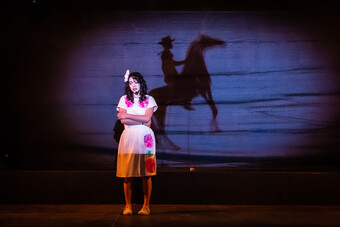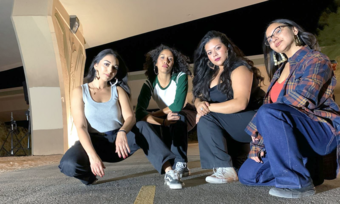Dreams of Resistance, Action, and Empowerment at ATHE 2014
At the historic Latinx Theatre Commons (LTC) National Convening in Boston 2013, the attendees were charged with creating a plan to build richer relationships between theater artists and scholars. The LTC convening attendees created a simple yet straightforward action step: to forge a stronger path for academics’ presence in theaters and artists’ presence in universities. As part of this effort, the scholars present in Boston pledged to bring Latina/o artists to academic conferences. Given the universal enthusiasm for this potential collaboration, there should be no surprise that the Association for Theatre in Higher Education’s (ATHE) 2014 conference in Scottsdale, Arizona provided numerous opportunities to showcase Latina/o artists representing, but not limited to, the Southwestern United States.
The conversations began in Tempe, Arizona as the Latina/o Focus Group’s (LFG) pre-conference gathered at Arizona State University for two days of sessions themed on “Fielding Questions About the State.” This pre-conference, led by me and my colleague Gad Guterman, invited attendees to interrogate the deeply divisive politics of the Arizona State Legislature’s SB 1070. The state law, passed in 2010, introduced the strictest anti-immigration measures of any state in the nation, drawing international and national attention. The purpose was to engage in conversation and to consider how this law has affected the day-to-day realities of living Latinidad and in exploring Latina/o identity on the stage. LFG membership met with immigration rights activists from the ACLU and Florence Project, participated in a workshop on performing activism and political protest, held a discussion with New Carpa Theatre Artistic Director James Garcia about his career as a journalist/playwright staging political works in a hostile climate, and attended a reading of Marc Pinate and Milta Ortiz’s play MAS—a new work commissioned by Borderlands Theater in partnership with the National New Play Network. Pre-conference attendees made their way to Scottsdale via bus, through a carefully planned route that covered important sites connected to SB 1070, labor history, and immigration. Through this tour, participants acquired a richer understanding of contemporary Arizona immigration policy and its implementation.
ATHE attendees continued to generate links between Arizona politics and performance when the official conference began in Scottsdale. LFG members staged numerous performances throughout the conference weekend, including Intimate Acts and an LFG-sponsored “read-in, ”which explored how censorship restricts the ways in which people imagine American identity. Works performed during these sessions included Amiri Baraka’s Great Goodness of Life presented by Performance in the Borderlands, Zoot Suit presented by UC Berkeley’s Teatro and the Performance Collective, Cherrie Morraga’s Heart of the Earth, as well as Virginia Grise & Irma Mayorga’s Panza Monologues. Additionally the LFG created an altar where all scholars affiliated with the conference were invited to read selections from Tucson Unified School District’s “banned books” list. These performances, freely visible throughout the conference, intervened in the other conversations happening throughout the gathering to remind the academic community that we could not remove ourselves from the repercussions of our conference location’s legislative acts.
Arizona generated opportunities for reflection and interaction, yet ATHE 2014 also provided numerous occasions for its membership to celebrate the rich cultural legacy of Latina/o theater and new possibilities for generating audiences. During the annual awards ceremony, the organization presented El Teatro Campesino Founding Director Luis Valdez with the Ellen Stewart Career Achievement for Professional Theatre Award. Later, acclaimed playwright Luis Alfaro delivered the conference’s keynote address, “Theatre’s Place in Times of Crisis.” Performing excerpts from a new one-man show and engaging in a conversation with professor Tiffany Ana López, Alfaro prompted the conference attendees to consider questions of audience development and offered examples from his career engaging audiences who might not regularly attend the theater, as well as encouraging the academic community to participate in the process of cultivating spectators. Similarly, during the conference’s plenary session, “Dream Activism and Pedagogies for a Changing America,” speakers Catherine Cole, Barclay Goldsmith, Dulce Juarez, Raquel Rubio, Tomás Stanton, Tamara Underiner and Patricia Ybarra summoned scholars to think more broadly about inclusion and the intersections of oppression across lines of race, gender, and sexuality in theater while noting the multiple parties of theater makers and spectators engaged in political resistance throughout the state. As we shifted away from all-conference sessions and into the numerous panels held throughout the weekend, scholars presented archival documentation and textual analysis about Latina/o theaters and voices, including Borderlands Theater, Nilo Cruz, Josefina López, Quiara Alegría Hudes, María Irene Fornés, Virginia Grise, Irma Mayorga, Elaine Romero, Carlos Morton, José Casas, and Kinan Valdez. This year, the presence of Latina/o scholarship was particularly noteworthy, as every panel block featured the presence of research spotlighting Latina/o or Latin American theater makers, plays, and performances.
During an informal reception sponsored by the LTC, conversation centered around the weekend’s success in positioning Latina/o theater and scholarship at the conference’s center, and the ever-present need to invite academics into theaters, artists into universities, and to continue exploring opportunities for collaboration. Conferences like ATHE, the recently-held Latina/o Studies Conference, the LTC 2014 National Convening and accompanying LATC Encuentro in Los Angeles, November’s American Society for Theatre Research (ASTR) conference, and the 2015 LTC Carnaval of New Work in Chicago each serve as important opportunities to build symbiotic networks that can potentially intertwine and prosper. In this instance, conference attendees left Arizona with a richer understanding of the ways in which local and state politics, scholarly activism, and theatrical engagement are inextricably bound, while encouraging ATHE membership to dream of acts to come.
Para pedir este ensayo traducido al Español, por favor escriba a [email protected].











Comments
The article is just the start of the conversation—we want to know what you think about this subject, too! HowlRound is a space for knowledge-sharing, and we welcome spirited, thoughtful, and on-topic dialogue. Find our full comments policy here
This is a very good digest of LFG conference activities! For photos of performances, readings, and panels, click on the photo gallery on our masterpage at http://www.athe.org/group/LFG